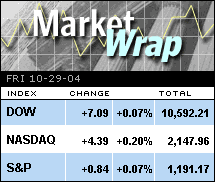NEW YORK (CNN/Money) -
Stocks tilted higher Friday, after struggling throughout most of the session, as investors sifted through a weaker-than-anticipated jobs report and the dollar spiraled to a new low versus the euro.

The tech-laden Nasdaq composite index (up 4.39 to 2,147.96, Charts) was up 0.2 percent, but off earlier levels. The Dow Jones industrial average (up 7.09 to 10,592.21, Charts) and the broader Standard & Poor's 500 index (Charts) each rose 0.07 percent.
Markets posted a stronger weekly finish, with the Dow gaining 0.67 percent, the S&P picking up 0.72 percent, and the Nasdaq surging 2.19 percent.
"At the end of the day about 3:45 p.m., the last fifteen minutes, there was a little bit of a pop and then [stocks] came back," said John Davidson, president and CEO of PartnersRe Asset Management.
"The surprise payroll data had a lot of impact," he added. "Offsetting that was a stronger-than-expected services sector survey."
A report showing that only 112,000 jobs were added to the payrolls in November -- versus the 200,000 increase economists were looking for -- cast doubts on the strength of the labor market. But the unemployment rate met consensus estimates, falling to 5.4 percent from 5.5 percent in October.
Davidson said he still expects the Federal Reserve's policymaking Federal Open Market Committee (FOMC) arm to raise its Fed funds target by 25 basis points when it meets December 14, although the weak jobs report may call that into question.
In other economic news, a report from the Institute for Supply Management showed that the services sector, which comprises roughly 80 percent of the economy, grew rapidly in November.
The ISM non-manufacturing index jumped to 61.3 in November from 59.8 in October, well ahead of consensus estimates for a 58.7 decline. A reading of 50 or higher signifies growth.
Investors had a slew of other news to digest, including a sharp sell-off in the dollar and receding oil prices.

The euro soared to $1.3444 in afternoon trade, breaking previous records set just this week. The dollar also hit a nine-year low versus the Swiss franc and ceded ground versus the yen.
Oil prices slumped for a third consecutive session Friday with crude futures losing 71 cents to $42.52 a barrel on the New York Mercantile Exchange. In London, Brent oil prices fell 85 cents to $39.30 a barrel.
Geopolitical concerns had some effect on trading as well. Spanish police confirmed five explosions near Madrid. The bombings were thought to be the work of the Basque separatist group ETA. There have been no reported injuries.
"Taking everything into account, the market was multidirectional. It has a split personality," Davidson concluded.
Friday's movers
Intel, the world's largest chip maker, announced late Thursday its fourth-quarter sales would beat its previous guidance. Investors saw this as a sign that this holiday season could be very merry in terms of computer and consumer electronics sales. Intel (up $1.20 to $23.91, Research) surged 5.3 percent.
Rival chip maker Texas Instruments (up $0.19 to $25.10, Research) rose less than 1 percent but Advanced Micro Devices (up $0.60 to $23.22, Research) picked up 2.7 percent. The Philadelphia Semiconductor index (up $6.57 to $445.28, Research) advanced 1.5 percent.
IBM (up $1.32 to $97.08, Research) rose 1.4 percent on a New York Times report the Dow component is selling its PC unit, valued between $1 billion to $2 billion.
Smith Barney Citigroup slapped Target with a ratings downgrade a day after the Minneapolis-based discounter said its November same-store rose 3.2 percent, in the middle of the retailer's 2 to 4 percent guidance. Target (down $0.70 to $51.70, Research) shares eased 1.3 percent.
Wal-Mart (down $0.07 to $52.93, Research) was little changed on the report, even as the Smith Barney report cited that retailer's shares as a more favorable investment.
Gap (down $0.15 to $21.48, Research) fell less than 1 percent a day after announcing its November same-store sales fell 4 percent.
Elsewhere, UBS smacked Alcoa (down $0.57 to $32.86, Research) with a stock downgrade, knocking the shares 1.7 percent lower.
Apple Computer (Research) lost nearly 4 percent of its value as Needham & Co. lowered their rating on the stock, citing valuation concerns.
Nokia (down $0.35 to $16.37, Research) lost nearly 2 percent amid concerns about management changes. The cell phone maker said early Friday its network unit chief, as well as a second executive, would be leaving the company.
And software maker PalmSource (down $1.13 to $14.87, Research) slumped nearly 7 percent on news its chief financial officer and treasurer have resigned.
Market breadth was mixed in robust trading. On the New York Stock Exchange, winners topped losers by about 5 to 3 on volume of 1.56 billion shares. On the Nasdaq, decliners narrowly edged past advancers 8 to 7 as 2.43 billion shares changed hands.
 |
YOUR E-MAIL ALERTS
|
Follow the news that matters to you. Create your own alert to be notified on topics you're interested in.
Or, visit Popular Alerts for suggestions.
|
|
|
Treasury prices surged on the weak employment report, with the yield on the 10-year Treasury skidding to 4.25 percent from 4.40 percent. Bond prices and yields move in opposite directions.
And in the commodities markets, gold prices rose.
Asian markets finished mixed, but Tokyo's Nikkei benefited from the Intel report. The major European bourses gave up their gains from the previous session. (Click here for more on world markets.)

|

